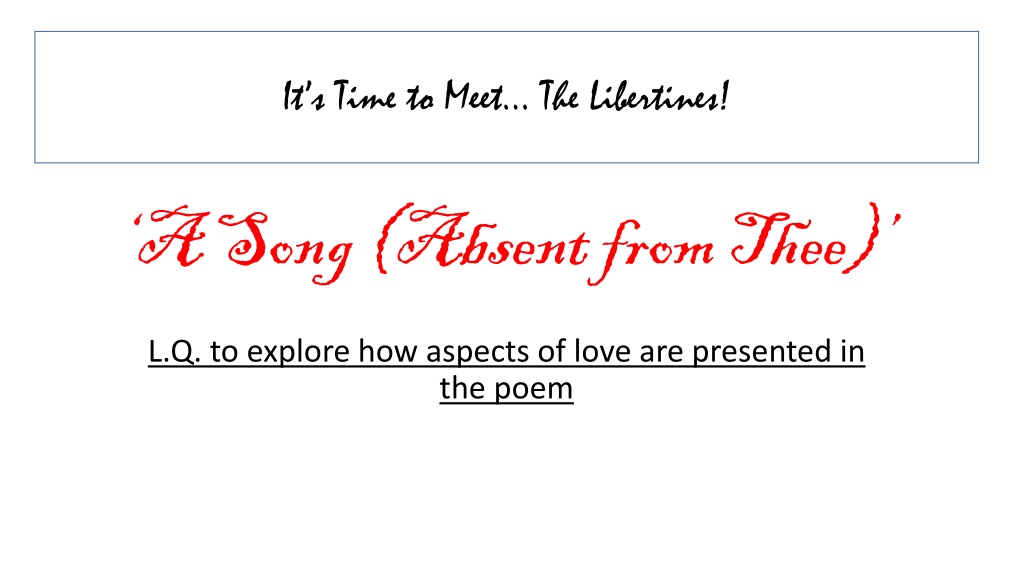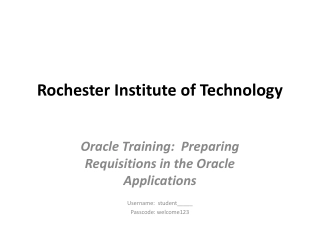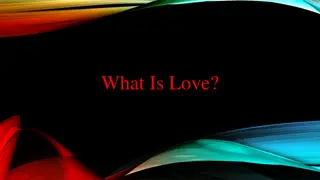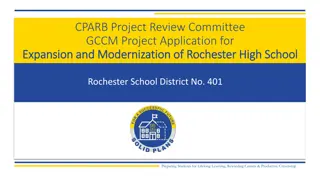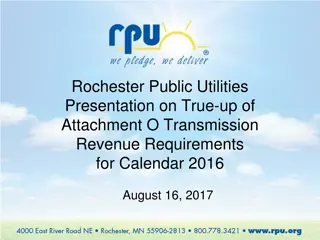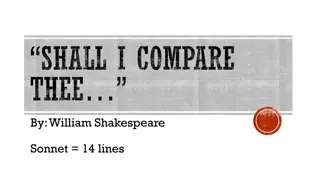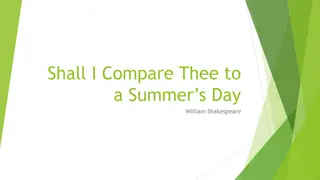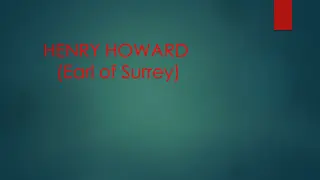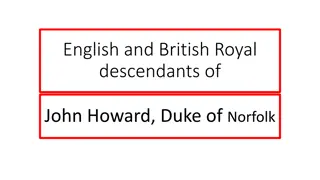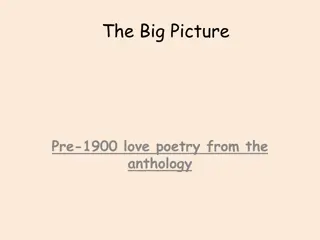Understanding Love in "Absent from Thee" by John Wilmot, Earl of Rochester
Explore the complex portrayal of love in John Wilmot's poem "Absent from Thee." Delve into the speaker's manipulative use of language to justify his unfaithfulness as a libertine, amidst the backdrop of Puritan morality and the Restoration era. Uncover the metaphysical nuances and societal influences that shape the poem's themes of love, desire, and self-indulgence.
Download Presentation

Please find below an Image/Link to download the presentation.
The content on the website is provided AS IS for your information and personal use only. It may not be sold, licensed, or shared on other websites without obtaining consent from the author. Download presentation by click this link. If you encounter any issues during the download, it is possible that the publisher has removed the file from their server.
E N D
Presentation Transcript
Its Time to Meet The Libertines! A Song (Absent from Thee) L.Q. to explore how aspects of love are presented in the poem
The poem- a basic understanding of meaning This poem is a dramatic monologue; but the speaker uses the classical form of the lyric disingenuously not to express raw emotion but to use self-serving logic to persuade the lady that she should approve his philandering. There are metaphysical overtones it is a song but the words in the brackets indicate there is something more going on than just a straightforward song. But this is another cavalier poet, although some might call Rochester a Restoration poet. However 17th century readers would have certain bawdy expectations of a Restoration song !
https://www.youtube.com/watch?v=FA5abHK vUBQ Take a full page and draw a heart shape in your books Context for this poem (AO3)
AO3: A Song AO3: A Song (Absent from Thee) (Absent from Thee) Puritan morality imposed on society 1649-59 by Cromwell Highly religious, strictly Protestant ethics promoting a simple life and purity of mind and body Restoration poets following the Royalists return to power celebrates the freedom from regulation following Cromwell s strict Puritan society. Oliver Cromwell dominates Parliament then becomes Lord Protector until his death in 1658 Royalist society once more Some of Rochester s poetry has similarities to the bawdy Restoration drama of the time: scandalous, sexual content; but he also satirises the characters he describes (much like Lovelace in The Scrutiny ) He s a real Libertine! Rise of Restoration poetry John Wilmot, 2nd Earl of Rochester 1647-1680 Another Cavalier poet, though slightly later than our previous examples Charles the 2nd becomes king 1660, restoring the Royalists
1647-1680 Restoration poet and rake John Wilmot, Earl of Rochester John Wilmot rarely met his father but did inherit his title his father had been a loyal servant to the King in exile and had saved his life, so John also inherited the King s goodwill and indulgence. The second Earl of Rochester was the embodiment of the new era, becoming as infamous for his wild behaviour as he was celebrated for his poetry. Andrew Marvell described him as the best English satirist . His life was divided between domesticity in the countryside and a riotous existence at court, with his behaviour leading to his reputation as the wickedest man in England . He died, aged 33, from the effects of venereal disease and alcoholism. He was reported to have recanted his atheism and libertinism on his death bed.
Rochesters extravagant frolics His wild behaviour included: the abduction of a wealthy heiress whom he wished to marry (3 weeks in the Tower) he later married her; being drunk for 5 years, leading to such extravagant frolics , lewd pantomimes, genital exposure and drunken violence at court that he was banished, then recalled; accidentally giving Charles a satirical verse that criticised him for being sex-obsessed at the cost of his Kingdom (banished from court, then recalled); smashing Charles treasured and extravagant glass sundials in drunken rant (fled from court, then recalled); disguising himself as a Doctor Bendo who specialised in curing fertility issues in women he also disguised himself as Mrs Bendo so he could examine women without raising their husbands suspicions; fleeing the scene after a scuffle with the watch ended with his friend dead, killed by a pike-thrust this gave him a reputation for cowardice, despite recorded bravery during war; boxing the ears of the King s jester an act of treason (got away scot free much to Samuel Pepys disgust).
New vocab for this poem put into sentences He displays insouciance (a lack of concern but with a wicked smile) towards his listener His frank admission in lines 6/7 typifies his scandalous lewdness / lasciviousness/ wanton nature This poem is typical of the Restoration period and Cavalier poetry: an amoral (no sense of moral wrongdoing) rakish (improper) figure, who seeks sexual gratification with disregard for Christian marriage values and lives true to a carpe diem and hedonistic spirit.
Key words to understand (AO2) Prove (v) Die or become no longer valid (Adj) Could mean wild in the contemporary context Fantastick (v) Could mean test in the contemporary context Languish Base (v) To suffer or weaken (Adj) Without moral principles OR describes someone of low social class Expire
Understanding and Interpretation: Fan and Pick Person 4 Person 2 Person 3 Person 1 Extends the thinking what can you add? Chooses card for person to their left Answers the question Holds the envelope ! Pass on the cards after each question (clockwise) Make sure that you have answered all the questions with your group (do help each other!) Annotate the poem with ideas as you go
Anything else? Anything else? Work with your face partner Did you notice ? the abstract nouns? the internal rhyme? Where/why/how? Impact? how he portrays his lady as morally superior? (where?) his apparent self-deprecating attitude and alleged reluctance to test this world of Woe ? Does he believe himself helpless to his urges? How do you respond to this?
Do you agree with this Do you agree with this summary of the poem? summary of the poem? Why/why not? Why/why not? Pair 1 minute thinking time Think Feedback as a class Share ideas with your partner Share This poem is a one-sided dialogue , apparently between a lover and his wife or mistress, similar to the poems by Donne, Marvell and Lovelace. In this case, the voice of the poet asks for her patience, loyalty and ultimate forgiveness whilst he is away from her. Then he can eventually return to her safe bosom and avoid staying with someone base and unblest , there to lose my everlasting rest condemned to hell.
Critical viewpoints Critical viewpoints make a note of these three views and choose one to these three views and choose one to respond to. respond to. make a note of Agree/disagree? Overview- why? Key reasons why, linked to writer s methods, typicality and context A. His songs are commonly smooth and easy; but have little nature and no sentiment. Dr Johnson B. He portrays love with thinly veiled scorn and this poem is not really about an apology to his mistress at all. C. The speaker expresses a difficulty with monogamous love but longs to re-commit to his lady s safe Bosom . Counter argument Conclusion
Rochester has taken a standard form and filled it with language designed to offend. We have already noted the deliberate ambiguity of the language. Now recognise that much of the romantic and religious language relies on clich for example: Romantic: from thine arms Religious: lose my everlasting rest The use of religious language and imagery throughout the poem means that the relationship between the speaker and his addressee resembles the one between an errant sinner and God. (Marianne Thormahalen, 2000). So, it is clear whether he is talking to God or to a whore? Remember that he was writing in a society where most people were religious and some puritanically so. A contemporary audience would be shocked in a way that simply wouldn t occur to a modern audience, i.e. us! Once religion is a choice and that denying God takes no great act of courage, the poem doesn t work in the same way.
Examine the view that Rochester presents the speaker in this poem as having an inconstant attitude to love. Think about: The characteristics of love The representation of the people involved The feelings of the speaker Any imagery or language used The way the structure and form reflects this
